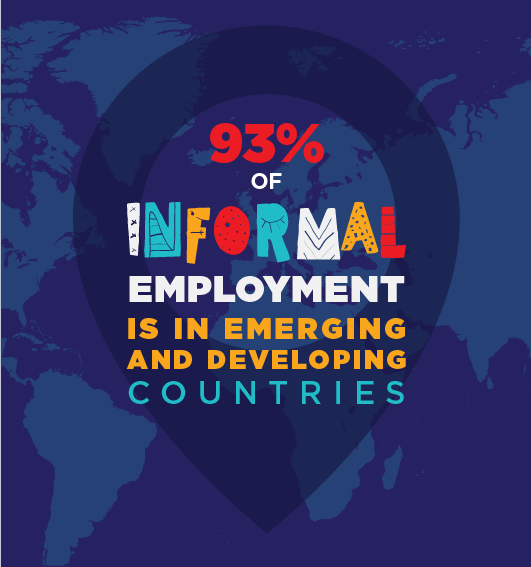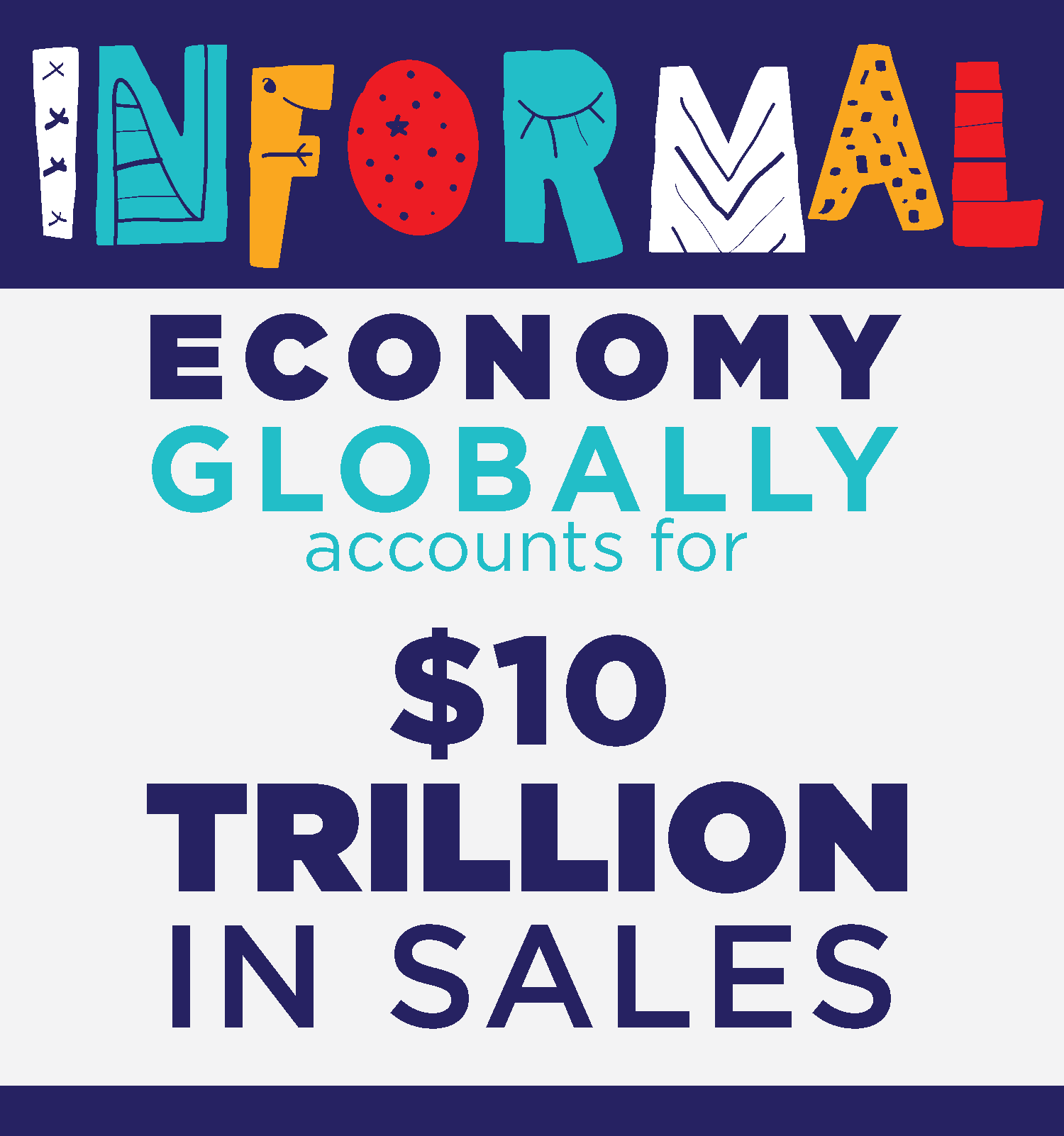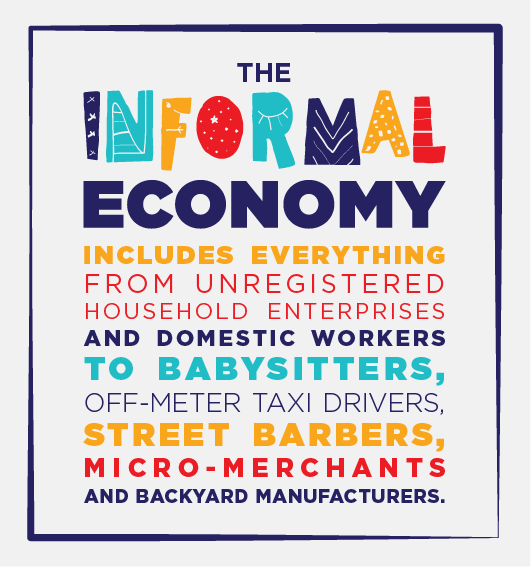POV

April 13, 2021
Informal Economy
“The coronavirus (COVID-19) pandemic is expected to take an especially heavy toll on emerging market and developing economies that have large informal sectors. Informal workers and firms are often not registered with the government and have no access to government benefits.”
World Bank

- More than 60 percent of the world’s employed population are in the informal economy
- The International Labour Organization estimates two billion people work informally worldwide
- Some 93 percent of informal employment is in emerging and developing countries
- Between 2010 and 2016, informal work made up around 40% of GDP across Sub-Saharan Africa, Europe and Central Asia, and Latin America and the Caribbean
Procter & Gamble derives more sales from informal and high-frequency stores than it does from Walmart, and corporates like Unilever and GSK are now using SMS-based, data-enabled systems for distribution to street merchants.
For most large companies—from consumer goods manufacturers to financial service providers—reaching and engaging the world’s vast informal sector remains a major challenge, with few direct distribution and communication channels available, not to mention the prevalence of counterfeit products, the scarcity of reliable data and the lack of customer access to finance. However, the so-called informal economy (also known as the grey economy, hidden economy, invisible economy, silent economy, underground economy, etc.) now presents multinationals and corporate marketers with a growing opportunity as new digital and mobile technologies bridge the gap between brands and the street and between financial services and unbanked entrepreneurs.
 Overall, the informal economy globally accounts for about $10 trillion in sales—the world’s second biggest economy behind the U.S. It includes everything from unregistered household enterprises and domestic workers to babysitters, off-meter taxi drivers, street barbers, micro-merchants and backyard manufacturers. And it dominates employment in Latin America and sub-Saharan Africa.
Overall, the informal economy globally accounts for about $10 trillion in sales—the world’s second biggest economy behind the U.S. It includes everything from unregistered household enterprises and domestic workers to babysitters, off-meter taxi drivers, street barbers, micro-merchants and backyard manufacturers. And it dominates employment in Latin America and sub-Saharan Africa.
Although it accounts for more than half of total global employment and up to 74 percent in labor markets like India, the informal economy is typically overlooked, untrusted, unmeasurable or inaccessible to branded manufacturers and service providers. In African cities, 84 percent of all consumer purchases of branded, unbranded and illegal goods are made through hawkers and high-frequency stores, most of which are unregistered, unregulated and untaxed.
Emerging markets experts say that the first hurdles faced by durable goods manufacturers and formal wholesalers are surprisingly similar to their formal economy challenges and include lack of data and inventory control.
Launched by a former Chicago tech student, start-up company Sokowatch has innovated a data-driven distribution system as a one-stop-solution for corporations to enter, compete with and monitor grey markets. Their patented mobile delivery app for delivery agents allows vendors to order needed goods via SMS for same-day delivery while also providing manufacturers with crucial data on what brands are selling and when, where and how these sales are made. The model recently won the Prince of Wales Entrepreneurship Award, and Unilever, Nestle and GSK are among Sokowatch’s corporate clients while 3,000 informal stores in Kenya and Tanzania purchase goods through Sokowatch every two weeks.
Founder and CEO Daniel Yu explains that real-time data and direct distribution can finally illuminate the hidden economy for corporates and provide a new level of inventory efficiency for a newly digitized network of retail shops.
“More than 85 percent of consumer purchases across Africa are made in small, informal retail shops, yet direct distribution channels to these outlets largely do not exist, limiting the availability of goods,” he says. “This negatively affects not only shops and consumers, but also manufacturers who suffer lost revenue and market share.”
Yu says the addressable market globally for corporates using mobile tech-based distribution is $88 billion.
Another unique challenge and opportunity for corporate marketers is that the informal economy already features a virtual army of unpaid marketers for their brands on the world’s streets, but without direction or incentives, their messaging is wildly inconsistent and often distrusted. For example, in Nigeria, where the informal economy accounts for the majority of employment, street vendors are widely credited as being the chief marketers for numerous formal brands, including those owned by Nigerian Bottling Company, UAC Foods and Chi Limited.
Mobile apps offer the potential to be the future messaging co-ordination point between marketing teams and street sellers.
Enoch Hwande, CEO of AllVirtuous—a pioneering, on-demand, investigative grey goods platform—says that marketers could play a game-changing role in the informal economy, but only if new distribution channels can be established that can cost-compete with cheap, knock-off goods at third-tier wholesalers in emerging markets.
“The major problem is that most multinational brands are pushing their products into three tiers of wholesaling, and by the time it gets to tier-three wholesalers in emerging markets, controls break down, a lot of the counterfeit products start appearing, and data starts disappearing,” he explains. “The informal sellers and hawkers are looking for the cheapest goods possible at those wholesalers, so they end up with counterfeits whether they want that or not. However, if there is a way for these big brands to have direct access to these merchants—perhaps through mobile technologies—then their marketers could innovate ways to turn these hawkers into trusted purveyors of their brand message. It would be tough assignment, but the opportunity is there.”
 Some multinationals have found that new distribution solutions are not enough and that, instead, new business models are required to access the bounty of the informal sector. For example, in West African markets, multinational telecom MTN failed in its initial model to sell phones and mobile contracts. However, its revenue soared after it changed its model to selling airtime, often doing so from roadside umbrella stands.
Some multinationals have found that new distribution solutions are not enough and that, instead, new business models are required to access the bounty of the informal sector. For example, in West African markets, multinational telecom MTN failed in its initial model to sell phones and mobile contracts. However, its revenue soared after it changed its model to selling airtime, often doing so from roadside umbrella stands.
Another challenge for market entry for corporates—and one that illustrates the need for mobile technology solutions—is the lack of potential in-country partners with knowledge of the informal market. Research by Dartmouth and Harvard universities, entitled “Informality,” found that “informal firms almost never become formal,” and due to lack of finance and a low value-add per employee, informal businesses grow at an extraordinarily slow rate. The global staffing average for informal businesses was only four members.
However, contrary to prior studies that suggested that informal businesses harmed registered companies by avoiding taxes and regulation, the researchers found that the informal economy represents far more of an opportunity than a threat to formal businesses.
“They are far from threatening to formal firms,” the authors stated. “Informal firms add only 15 percent of the value per employee of formal firms…and we present some evidence indicating that these productivity differences reflect reality, not just underreporting of sales. The ratio of value added by informal firms to that by formal firms ranges from 1 percent in Congo to 70 percent in Cape Verde.”
In some cases, informal traders have signaled their desire for greater trust and a need for new brand messaging for themselves. In Spain, a cooperative of 200 unregistered street businesses, largely operated by undocumented immigrants, have even launched their own collective clothing brand, Top Manta, specifically to counter perceptions of low-quality or counterfeit products on the street.
But even where goods sold are illegal or pirated, some researchers claim that some brands actually derive a market research benefit from the bootleg trade. In a presentation on the TED stage, author and researcher Robert Neuwirth said one major footwear and apparel brand conceded privately that pirate sales serve as an invaluable barometer of their own genuine product lines because it’s not worth making if no one wants to knock it off.
He added that large companies like UAC Foods were accessing the grey economy with products like Gala sausage rolls, which are designed to be sold by hawkers for pedestrians and motorists in traffic jams. In the fast food sector, the KFC franchise has achieved significant market share in countries like South Africa through products and marketing campaigns tailored for the cash economy and by winning the trust of consumers by setting up outlets near informal markets in rural towns.
While the informal economy itself remains stubbornly outside of and separate from taxed economies around the world and is changing at slow rates, the proportion of its members who are included in formal financial systems is rapidly changing, providing a new potential access point for brands.
Six years ago, 2.5 billion adults around the world lived their lives without a bank account. That number dropped by an astonishing 700 million in just three years with the deployment of mobile money systems and digital technologies, and the World Bank projects that the number of people outside of the financial system could plunge to just 1 billion by 2020. The world’s largest financial inclusion program—JDY—operates in India and has led to 255 million bank account openings in just a few years.
Meanwhile, banked populations more than doubled in countries like Tanzania, El Salvador, Congo and Cambodia in just three years while the proportion of unbanked residents fell even in many developed countries, including the U.S. And 6 percent of totally unbanked adults in sub-Saharan Africa now use mobile money systems.
Including street merchants, many seasonal laborers, barter traders, undocumented immigrants and freelancers, unbanked consumers—55 percent of whom are women—pay no income taxes, can’t borrow from banks and must pay for their services in cash. They also suffer higher transaction costs, with the average unbanked person having to pay an extra $198 annually for check-cashing services, according to NerdWallet, and at least an extra $196 for prepaid cards. Until the recent advent of low-fee digital transfer solutions, they also paid exorbitant fees for remittance transfers.
Experts say the dramatic boost in financial inclusion is not only leaving consumers with more cash to spend on branded products, but it is also providing new avenues to credit and financing for informal entrepreneurs.
Historically, only one formal financial industry—the $430 billion international remittance transfer market, led by Western Union and MoneyGram—has had deep access to the underground economy. Now, mobile money systems and digital transfer platforms are simultaneously freeing up cash in the informal economy while also providing new access points for marketers and corporations. Leveraging technologies like blockchain, bitcoin, mobile phones and innovative transfer models, companies like WorldRemit and Transferwise are slashing high remittance fees.
Financial technology company Lenddo uses advanced analysis of billions of unstructured data points to create credit scores for informal-sector entrepreneurs and underbanked people who could never otherwise qualify for bank loans. Using predictive algorithms and non-traditional data, the Singapore-based firm began as an effort to provide micro-loans to the lower middle class in developing countries by computing reliable credit scores. Now, it partners with major third-party financial institutions, which trust customer identities and creditworthiness scores derived from patterns unearthed through social networks like Facebook, LinkedIn and Twitter. Now operating in 20 countries, its mission is nothing less than “to improve credit access for at least a billion people” by 2020.
Hwande says fintech innovations and mobile money held the potential to open informal businesses to partnerships with western brands.
“Mobile cash systems present a major opportunity because most people withdraw their mobile money at an informal sector shop, where they can also spend that money,” he says.
For financial services companies, one access point to informal entrepreneurs that has emerged from research is the provision of tailored products like zero-balance accounts and a marketing message that banks are interested in the business of the unbanked. According to an ongoing academic study of JDY by researchers at Columbia and McDonough business schools, 77 percent of its 255 million new account holders maintained positive balances, but 81 percent of this newly banked group did not deposit any money at all into their new accounts for months after opening them, showing the value of zero-balance accounts. In a crucial role for marketers, the researchers also found that customers who perceived banks to be interested in their business were three times more likely to open an account.
The Dartmouth research also found that fear of taxation and regulation were not the major barriers to either growth or formal graduation for informal entrepreneurs—with less than 10 percent primarily worried about permits or legal issues—but rather their lack of access to capital.
However, those same researchers found that what informal entrepreneurs should be most worried about is how to boost their very low value-add and low trust levels among their customers. New data-driven efficiencies of more trusted and needed products through digital distribution solutions could provide a new on-ramp for value in the informal economy—and greater predictability for brands.
CMO Council
Please login to join the discussion
Comments
No comments yet.
Premium Membership
If you are a registered CMO Council member, upgrade to a Premium Membership. Not only will you gain access to this report, you will also gain access to over 300 full data reports and studies. Premium membership delivers access to all reports, the CMO Council Insight Center and the private mentorship community, CMO+.
Library Subscription
If membership is not the right fit, a library subscription provides access to the reports and content you value. As a subscriber, you will gain unlimited access to all CMO Council content, including over 300 reports, executive summaries and white papers as well as unlimited access to thousands of data points and articles in the curated Insight Center.
